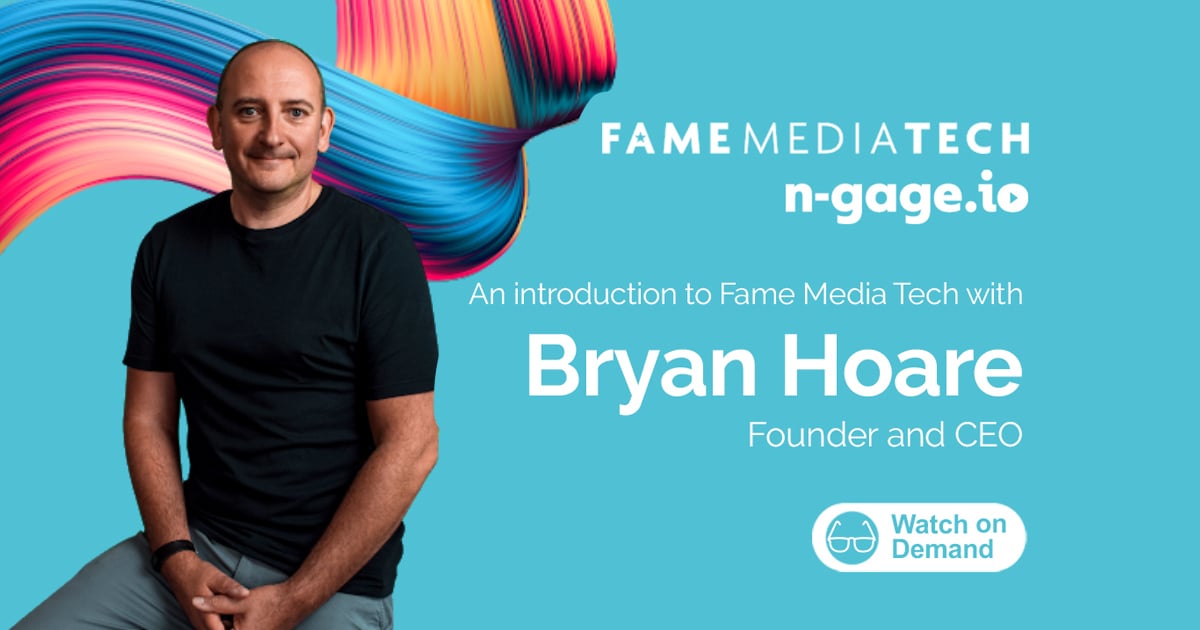Watch Now: Bryan Hoare Discussing Fame Media Tech and their Considerable Market Opportunity
A few short weeks ago, we had the pleasure of interviewing Bryan Hoare and hearing first-hand about Fame Media Tech. Currently live on the GrowthFunders investment platform with their SEIS-eligible investment opportunity, Bryan took the opportunity to provide an insightful overview of Fame Media Tech.
Transforming the fan, visitor and customer experience through the use of innovative technology and immersive experiences, Fame Media Tech was founded in 2018 and since their inception, they have worked intently on developing their solutions based on clear market needs – when you explore exactly how even some of the biggest brands in the world are engaging with their audiences, it becomes instantly visible just how much of a demand there is for the industry to be transformed.
The Market Opportunity
One of the most notable points surrounding Fame Media Tech is the market opportunity in front of them. As audiences – customers, fans or visitors – that continually engage with brands in a whole variety of different ways, our needs and expectations are changing. The way we view a brand differs to how it did just a few short years ago and that’s directly impacting on our levels of loyalty.
Bryan highlights this perfectly in the webinar, saying:
“Customers are no longer basing their loyalty on price and product alone. They’re staying loyal to companies because of the experience that they actually receive. That is resulting in companies now having to revisit their customer engagement strategies and starting to look at new ways in which they can create programmes which generate that loyalty and improve loyalty through experiences.”
Additionally, Covid-19 has showcased the change in market needs clearly – and in many ways, has expedited its rate of change. When we have limited possibilities to engage with a brand in person, we don’t expect for the brands to ignore us – we expect them to reach us in other ways, most notably digitally.
Touching on this in the webinar, Bryan explains:
“There was another survey recently by Vanson Bourne. The survey respondents said that 77% of their digital experience brands have changed since the start of the pandemic. It just goes to show that customers are starting to look at it right now.”
As we mentioned in our previous blog post, solutions exist that utilise technology to improve our digital experience with brands. When you attend a theme park there’ll very often be a dedicated app now so you can see wait times for rides. Similarly, a lot of museums have apps that allow you to download maps with information on the exhibits.
And although this may be a considerable improvement on where we were in the immediate past, these experiences are only scratching the surface of what’s possible.
They’re not innovative or immersive; they’re not groundbreaking or offering anything truly transformative – offering something that makes you believe the brand is truly engaging with you as an individual and which genuinely enhances your experience with them.
As Bryan discusses in the webinar, this is exactly what Fame Media Tech are providing – innovative and immersive solutions that completely transform the fan, visitor and customer experience.
Fame Media Tech’s SEIS-Eligible Investment Opportunity
Live on the GrowthFunders platform raising £150,000 to further their technology development and strengthen their team, for investors focused on tax efficient investments, it could prove to be an appealing consideration.
Being SEIS-eligible, any investments into Fame Media Tech’s current round can be eligible for 50% income tax relief. This effectively means an investment of £1,000 would cost an investor, after tax reliefs are accounted for, £500.
As with all such investments, it’s imperative due diligence is carried out sufficiently as your capital is at risk and returns aren’t guaranteed, but you can view the full investment details – and download the Investment Memorandum – via the Fame Media Tech pitch page.
In addition, you can read more on investing into opportunities that are SEIS-eligible in our guide to the Seed Enterprise Investment Scheme (SEIS), which covers everything from the associated tax reliefs through to the risk/return balance.
%20(3)%20(2).jpg)





